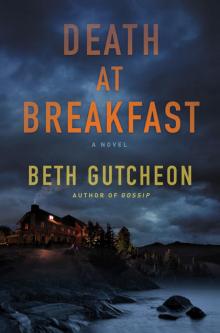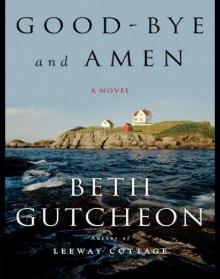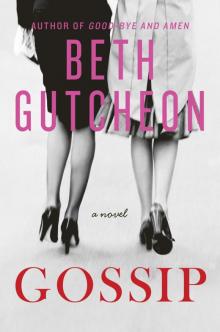- Home
- Beth Gutcheon
The Affliction Page 15
The Affliction Read online
Page 15
The fourth-floor office had a lovely view of the Hudson, she discovered while giving the receptionist her credit card. She’d been too miserable when she arrived to notice, so she must be better. In the hallway, she deliberated between the elevator and the stairs, deciding in the end that the elevator presented less challenge to her spinal rearrangement, and pushed the button.
A lady was already in the cab when it arrived. Hope nodded to her as she entered, and then mentally returned to her plans for the day, now that she could move without screaming. Hearing about Maggie’s visit to Pam the angry housemother was at the top of her list, right up to the moment the elevator gave a lurch and stopped.
Hope and the other woman looked at each other. Her companion was of medium size and age, with shining dark hair pulled back in a ponytail and full unpainted lips. Her dark brown eyes were adorned with stylishly redesigned eyebrows of an alarming severity.
“Tell me you’re not claustrophobic,” said Hope.
“I’m not,” said the other.
“So far so good,” said Hope. “What should we do?”
“Push that red button?”
“Let’s give it a minute,” said Hope, pushing the button marked L just to be sure the elevator knew where it was supposed to go. It apparently knew and didn’t care.
“I’m Hope Babbin, by the way.”
“Margot McCartney.”
“Nice to meet you. Sort of. What do you think, red button?”
“Let’s do it.” Margot pushed the red button and an alarm began shrilling.
“I can’t say that’s much of an improvement,” said Hope. The alarm rang and rang and nothing else happened. Then it stopped.
“Oh, I feel so much better,” said Hope. “What now?”
Margot began pounding on the walls of the cab. Hope joined her and then both added shouts.
“Hello?”
“Hello?”
“Hello, can anybody hear us?” Whap whap whap.
Somewhere far below them, they heard a muffled male voice. He was not inside the elevator shaft, wherever he was, and they could hear only the interrogatory in his voice, not actual words.
“We’re between floors! We’re stuck! There are two of us!” they cried in overlapping answers, trying to guess what question had been asked. Then they stopped and listened. Far below there was some feckless banging, much like the noise they had made themselves, then the voice called up to them again.
“What did he say?” Hope asked.
“I think I heard ‘Fire Department,’” said Margot McCartney. Then there was silence.
After a long moment of stasis, Hope sat down on the floor of the cab. Margot joined her. Hope said, “If you have to use the loo, please don’t mention it to me. Not that, or running water, or faucets, or Kegel exercises.”
“Gotcha,” said Margot.
“Also, please don’t make me laugh.”
“No,” said Margot.
They sat in silence. After what seemed an eon, Hope said, “Well at least the lights are still on. How about rock, paper, scissors?
Margot stuck out her fist and Hope counted to three. Hope threw scissors, Margot threw rock.
“Damn,” said Hope. “Let’s keep score.”
Margot was down by five points and Hope was at twenty-three when the lights went out.
Hope waited for her eyes to acclimate. They didn’t. The darkness was thick and total, like a black hood over your head.
“I close my eyes and open them and it makes no difference,” said Margot.
“None,” Hope agreed.
They sat listening to each other breathe.
“So,” said Hope at last. “Do you come here often?”
Margot let out a bark of laughter.
“Fairly often. You?”
“My first visit. I was at the chiropractor. Dr. Backache.”
“I was with my accountant.”
“Do you live here?”
“Yes. We’ve been here for about four years. My husband was with the Trump organization in New York and he decided to go out on his own.”
“As what?”
“Developer. Real estate.”
“So you moved here from the city? Was that okay with you?”
After a brief pause, Margot said, “I’ve adjusted. The school district is pretty good, and I’m making friends.”
“Are you? How?”
“Oh you know. Parents at my kids’ school. That sort of thing. No soul mate yet, but people to have coffee with. What about you?”
“I know just what you mean,” said Hope. “I moved to Boston last year to be near my grandchildren, but it’s dawning on me, I’m not really the hands-on granny type. My daughter is crazy busy, and I meet people my age, and they’re perfectly nice, but they want me to join things. To tell you the truth, I’m here hiding out from my new book group. What do you do with your time? Do you work?”
“I manage my husband’s office. Keep the books and so on.”
“How did you choose Rye-on-Hudson?”
“A business opportunity. But now a terrible thing has happened to his partner’s wife.”
Hope felt a prickle on her arms. Or thought she did; she’d been reading a lot of detective fiction and was a fan of the inexplicable intuition.
“You don’t mean Florence Meagher?”
“Yes! Do you know her?”
“No, but the friend I’m traveling with met her at the school. Rye Manor.”
“My husband is on the board there!”
“Are your children at Rye Manor?” Hope had registered that she’d mentioned the good school district but wanted to know where Margot would take the subject.
“No, we have boys. And we couldn’t afford it anyway. But as I said, Lyndon and Ray Meagher have this real estate project, and Lyndon thought joining the board would be good PR in the community.”
“This is so interesting. Ray Meagher. He must be devastated, poor man.”
“He must be. I haven’t seen him since she died, but Lyndon has. Says he’s like in a fog. Can’t seem to put one foot in front of the other.”
“Are they very old friends, Ray and your husband?”
“Not that old. Lyndon’s not the kind of man who makes a lot of friends; he leaves our social life to me. Such as it is. But he met Ray in Atlantic City, and somehow, they hit it off, and then Ray had this great idea.”
“Atlantic City?”
“Yes, Lyndon was there with the Trump organization, and I guess Ray was a regular.”
“Regular gambler?”
“Yes. I don’t have the itch myself, but Lyndon enjoys it. He can take it or leave it, don’t get me wrong, he doesn’t have a problem. But he’s under a lot of pressure from business, and it’s good for him to blow off steam.” She subsided, perhaps noticing that she didn’t sound entirely convinced herself.
“You’re a very understanding wife,” Hope said into the blackness. She wondered if she saw a tiny crack of light between the doors of the elevator, or was that a hallucination, brought on by sensory deprivation.
Margot said, after a thoughtful silence, “Not all that much. We came here because there was an opportunity. Ray said. Complicated, with a lot of moving parts but a really big payday, was the pitch. It’s just that it’s taken much longer than we expected to put the pieces together and honestly . . . We don’t have any cushion. The boys are growing up, they need things. It hasn’t been an easy time.”
She did see light through the crack between the doors. Then a voice from close above them. “Hello?” a man called. His voice was deep, offhand and confident.
“Hello, we’re here,” both women shouted.
“Took us a while to find out where the car was,” said the voice. “Just hold tight. We’re going to move it manually and we’ll have you right out of there.”
Then the lights came back on. Hope and Margot looked at each other and remembered that they were strangers. Except, not, anymore. Margot smiled, suddenly finding th
e situation silly.
Hope said, “I’m terrified that if I stand up I’m going to soil myself.”
“I’m sure you’re not,” said Margot. The elevator cab began to lurch, and there was a lot of yelling up and down the shaft. Margot grabbed Hope’s hand and they braced themselves, hoping they were not about to plummet into the basement. After minutes of jerking, swinging within the shaft, and noise, the doors opened and they were released into the lobby.
Hope finally found Maggie in the Katherine Jones room, after she had changed her clothes and had a club sandwich and restorative pot of Lapsang souchong at their hotel. Maggie had spent the morning with Danny, the school’s IT guy, learning all he knew about TickTalk, which wasn’t much. There was a block on Wi-Fi access to the site from anywhere on the campus, but you could still get to it easily through a cell tower. And of course Wi-Fi off campus, down in the village, say, was wide open.
For the moment, Hope was more focused on the news that Lily Hollister didn’t want her parents told about her troubles at school. “I’m shocked that Caroline let me think things were ducky at home,” said Hope. “Are you sure young Steph wasn’t making things up?”
“The TickTalk posts are certainly real. And a sixteen-year-old who doesn’t want her parents told something like that is upset about something . . .”
Hope felt unsettled. She and Caroline were such old friends. Well, such long-term acquaintances connected by so many cross-threads. Hope after all had told Caroline everything. More or less. Maybe not quite everything about her former husband and his popsy in the marital bedroom, which was too shaming, but.
“Think of it from Caroline’s point of view,” said Maggie, her thoughts keeping pace with her friend’s. “She’s had one failed marriage. It would be painful to admit to you she’d made another mistake, if tension in the marriage is the problem.”
“I don’t see why, I’ve made enough mistakes myself,” said Hope. But Maggie’s attention had reverted to the cyber-mean-girl situation.
“How are we going to sort out this TickTalk business without calling the police?”
“Don’t you know any hackers?” Hope asked.
“I do, of course. One of my favorite Latin students from years ago developed quite a little sideline at MIT. Now he teaches workshops at Langley called something like ‘Coding for Poets.’”
“Why poets?”
“Calling it Hacking for Spies sort of eliminates the element of surprise. But I hate to bother him with this while he’s busy defeating ISIS, if he is.”
“Do a search on TickTalk, let’s see who’s behind it,” Hope said. “How does it make money?”
Maggie typed and soon said, “Here’s a piece from the Financial Times. Blah blah blah Bitcoin, no that’s not it, blah blah. . . . Oh!”
Hope came around behind her and peered over her shoulder as Maggie read. “Kenneth Liu and Isabelle Marszalak, friends since they met at Wesleyan University, hit on the idea for a digital campus message board. ‘We thought there was a need for a place to post anonymously, like you can on a bulletin board in a dorm. Say you want to know if anyone else thought the math quiz was impossible, or if anyone found the sweater you lost. It would be geographically limited, just for communication within a particular community . . .’”
“Tell me one of those kids went to Winthrop.”
“That would be handy, wouldn’t it? No, but a Rose Liu teaches music at Nightingale-Bamford. We’ve served on committees together. I’m almost sure that her son’s name was Kenneth, and I know he went to Wesleyan, let’s just see . . .”
“Why does this not surprise me at all?”
A few taps more brought her to Kenneth Liu’s Wikipedia page. “New York City, Stuyvesant High School, Wesleyan University, married to Leigh Anne Johnston . . .” She typed some more and found a wedding announcement for Leigh Anne Johnston and Kenneth Liu, married in New London, Connecticut, a year previously. “Got it,” she said. “‘The bridegroom is the son of Charles Liu, owner of a restaurant in Jackson Heights, and of Rose Monaghan Liu, who teaches music in New York City. The couple plans to reside in Manhattan after a wedding trip to Bali.’”
“Bali. I guess the TickTalk business is pretty good.”
“Danny told me this morning that it’s raised a lot of money, but the bullying issue is a problem for them. And well it should be.”
“Can you get to him?”
“It might take a few phone calls.”
It took two. Kenneth Liu returned Maggie’s call as soon as he got back from lunch in the city. They arranged to meet in his office the following morning.
“I need a night at home to do my laundry and pack fresh clothes anyway,” said Maggie.
“I’ll go down with you,” said Hope. “I think I need another talk with young Caroline.”
* * *
While Maggie wallowed in the domestic pleasures of her own bathtub that evening, her own enveloping bathrobe, takeout from her favorite Vietnamese restaurant, and the satisfaction of dispatching a week’s accumulated mail, Hope was waiting for Caroline Hollister at JoJo in the east sixties. It was a favorite of hers, cozy and old school, with a flattering pink light. It was steps away from the Town Club, where she was staying, and they served a devastating butterscotch pudding.
The first to arrive, Hope was surprised to be shown to a corner table set for three. Caroline had made the reservation. Hope had hoped for a tête-à-tête, but this might be just as useful, a chance to study Caroline and Hugo in close quarters.
But when the hostess led Caroline to their table, she was followed not by Hugo but by, unmistakably, Hope’s onetime beau, Angus Westphall. He looked almost exactly as he had when she last saw him decades earlier, but thinner than in his self-satisfied salad days, with only a few wisps of his once luxuriant hair combed across his bald pate, and something sad in his expression.
“I hope you don’t mind my crashing the party,” he said before Caroline could speak. “I heard that Caddie was going to see you tonight and I couldn’t resist.”
“Of course not, I’m delighted,” Hope said with a warm and not entirely fraudulent smile. Angus kissed her cheek and took the chair across from her, as Caroline slid in beside her on the banquette.
After they placed their orders, the talk, predictably, was a firehose stream of data from all three, about children, old friends, their parents and siblings as they’d been when they’d all first known one another. Angus had three grown children and four stepchildren from three different wives, and had developed a scholarly as well as personal interest in the Great Camps of the Adirondacks. Caroline’s children from her first marriage were both married with children of their own, the son in finance, the daughter an economist.
“Hugo is hell-bent on proving that his daughter with Caddy is every bit as much a world beater as her first two children,” Angus said, giving Caroline a teasing smile.
“That’s not true,” Caroline said, throwing a bread pellet at him. “He’s terribly proud of Lily.”
“It’s totally true,” said Angus, in a needling move Hope remembered from when they were young. Once a big brother, always one, she thought. “Hugo is so competitive, you’re lucky dueling has been outlawed. He’d have Roger Donovan out at dawn with pistols in Central Park tomorrow.” Roger being the father of Caroline’s older children.
“With my luck, they’d just blow each other’s feet off, and I’d end up nursing both of them, like Zeena Frome,” said Caroline.
“You’re much too nice to your ex-husbands,” said Angus.
“Singular. I only have one. And of course I am, I’m a very nice person.”
“That’s true,” said Angus, and turned the conversation back to Hope. How was she liking Boston? Did she text or tweet, and would she friend him on Facebook? Then their desserts were served, and the talk turned to summer plans. Hugo and Caroline and Lily would spend part of the summer on Bride Island, where Lily had a job teaching sailing. When asked if she enjoyed it, Caroline admi
tted she could do without quite so many of Hugo’s Caldwell cousins, but she had to be there to chaperone Lily when Hugo was working. What was his work? Hope asked. Private art dealer, said Caroline. Before Hope could ask for details, Angus announced that he would be at his “place” in the Adirondacks of course, which Hope didn’t need to be told would be on the scale of a medium-size hotel, where he hosted a rotating cast of children and grandchildren all summer. He would love it if Hope would bring Lauren and the twins for a visit. She noticed he didn’t show the same enthusiasm for hosting her son, Buster, the sheriff, who lived in a trailer in rural Maine with his unwed girlfriend. Which indifference would be entirely shared by Buster.
Chapter 9
Wednesday, April 29
Wednesday morning brought Maggie to Kenneth Liu’s office downtown, near the majestic old Police Building on Centre Street. The Police Building had been abandoned in the 1970s, hopelessly infested with roaches and rodents; police brass had apparently never been that careful about where they left their food scraps. Naturally, now that “fashionable SoHo” had sprung up on its western perimeter, it had been converted into expensive condominiums, and served as a magnet for the trending and the fashion-forward on the streets around it. The address Maggie had been given was for a loft building just off Cleveland Place with a storefront selling cunning housewares on the ground floor and on the second, a gigantic open space with temporary barriers marking off rental office areas, a shared pair of receptionists opposite the elevators, and in one corner, a sort of private café with bookshelves, bistro tables, a refrigerator, microwaves, espresso machines, and a full-time coffee barista.

 The Affliction
The Affliction Dead at Breakfast
Dead at Breakfast Good-bye and Amen
Good-bye and Amen Leeway Cottage
Leeway Cottage Gossip
Gossip Saying Grace
Saying Grace